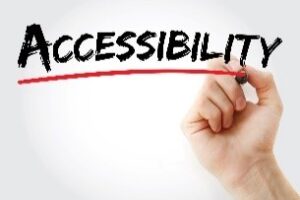Who is Responsible for Providing FAPE?
 I enjoy receiving e-newsletters from WrightsLaw and found their information on a free and appropriate public education (FAPE) in the least restrictive environment (LRE) to be very interesting. Although it is written for the parent’s perspective, the responses may be equally appropriate when professionals are advocating for access and reframing the concept of LRE in terms of students who are deaf or hard of hearing.
I enjoy receiving e-newsletters from WrightsLaw and found their information on a free and appropriate public education (FAPE) in the least restrictive environment (LRE) to be very interesting. Although it is written for the parent’s perspective, the responses may be equally appropriate when professionals are advocating for access and reframing the concept of LRE in terms of students who are deaf or hard of hearing.
The purpose of the IDEA is “to ensure that all children with disabilities have available to them a free appropriate public education that emphasizes special education and related services designed to meet their unique needs and prepare them for further education, employment, and independent living…” 20 U.S.C. 1400(d). Is the IEP designed to meet the child’s unique needs? Will the goals in the IEP prepare the child “for further education, employment and independent living?” The answers to these questions will help to determine if the IEP is appropriate and provides the child with a free, appropriate public education.
Educational Benefit
Courts have held that to receive a free appropriate public education, the child must receive meaningful educational benefit. How will you know if the child is receiving “meaningful educational benefit”? As this issue of the Bimonthly Updates discusses, you use objective information from tests that measure the child’s knowledge and skills.
The legal landscape is changing. The No Child Left Behind Act of 2001 requires states to adopt high academic standards for all children. The law also requires schools to test all children to determine if they are mastering these standards. When Congress reauthorized IDEA in 2004, the focus shifted from access to the schoolhouse and compliance with procedures to improved outcomes for children who receive special education services.
In Endrew F. v Douglas County (March 22, 2017), Chief Justice Roberts explains that SCOTUS is not reversing the old Rowley standard, but – if a child is not fully integrated in the regular classroom, the focus on FAPE shifts even more to the “unique circumstances of the child.” Read the analysis.
Who is Responsible for Providing Free Appropriate Education (FAPE)?
The school is responsible for providing the child with a free appropriate education (FAPE). The child’s Individualized Education Program (IEP) is the roadmap that describes how the school will provide your child with a FAPE.
“The IEP provisions [of IDEA] reflect Rowley’s expectation that, for most children, a FAPE will involve integration in the regular classroom and individualized special education calculated to achieve advancement from grade to grade.” (Page 11)
“When a child is fully integrated in the regular classroom, as the Act prefers, what that typically means is providing a level of instruction reasonably calculated to permit advancement through the general curriculum.” (Page 13)
The decision is clear. Being “fully integrated” and “making progress in the general education curriculum” are the keys. If a child is not fully integrated, the focus shifts even more to the “unique circumstances of the child.”
The “IEP Must Enable Child to Make Progress: A Plan for Academic and Functional Advancement”
Resources
Wrightslaw article: Who is responsible for providing FAPE?
Note: the views expressed are those of Karen Anderson, PhD, and do not constitute legal advice.
